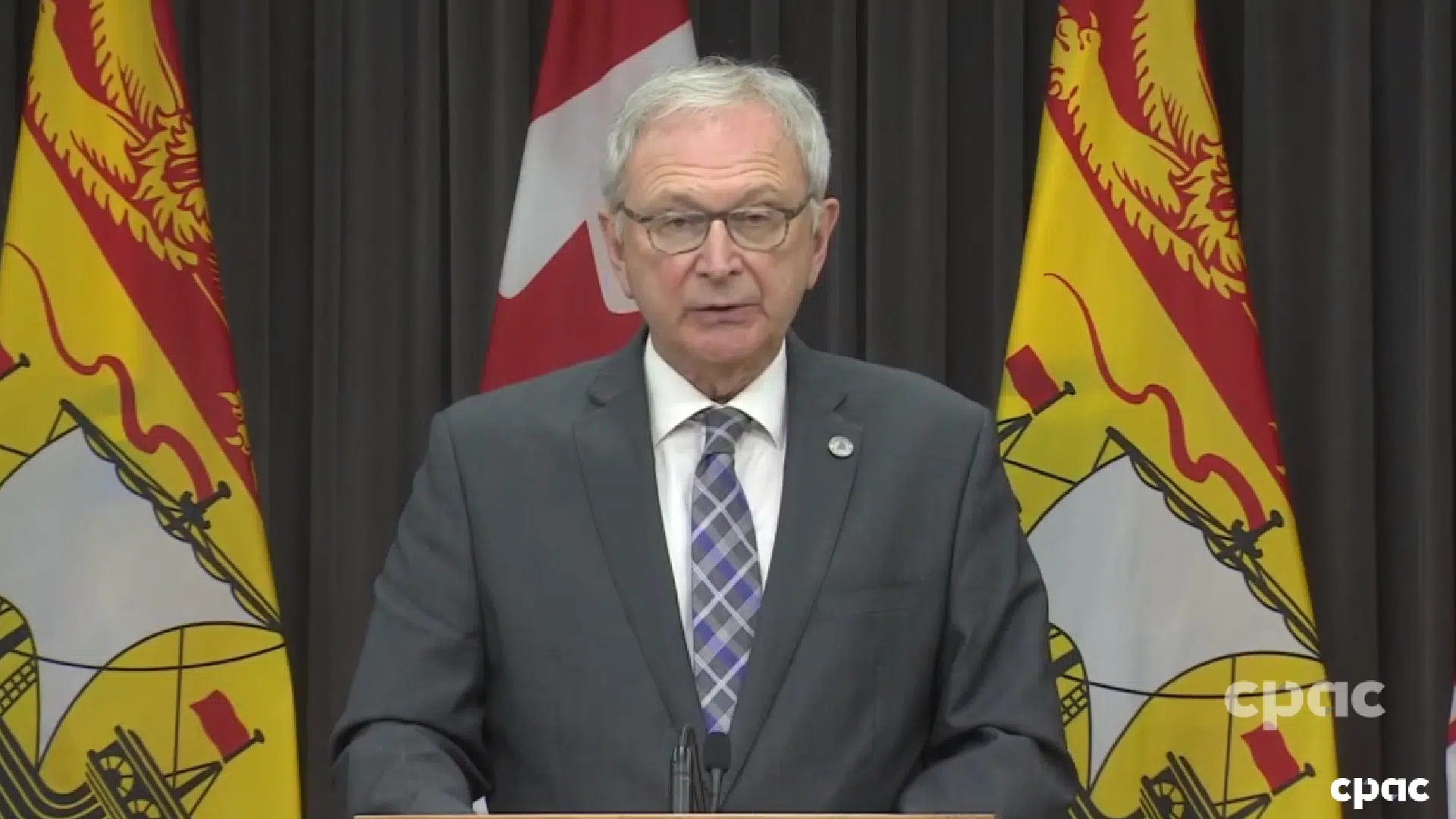
A file photo of New Brunswick Premier Blaine Higgs during a COVID-19 briefing on Dec. 13, 2021. (Image: CPAC video capture)
New Brunswick Premier Blaine Higgs says he has tested positive for COVID-19.
He made the announcement at a Friday press conference in Fredericton with Health Minister Dorothy Shepard, Education Minister Dominic Cardy and Dr. Jennifer Russell, New Brunswick’s chief medical officer of health.
Higgs said he felt ill about one week ago and took a rapid test on Wednesday morning, which came back positive. The premier’s symptoms have been mild, which he credits to being fully vaccinated against the virus.
Both he and his family are self-isolating while he awaits a PCR test.
“I have a bit of a cough, I have a sore throat, some head congestion and the symptoms are very much like having a cold,” said Higgs. “But having said all this, I’m thinking how fortunate that we are and how blessed we are in this province to have access to vaccines.”
“We’ve all determined that none of us are immune to this, including obviously myself, but we do know that vaccinations work,” said Higgs.
Higgs said the province is doing everything in its power to ensure health care workers won’t have to choose between “who lives and who dies.” He understands many New Brunswickers might be tired of the pandemic after the last 22 months.
Still, he encourages residents to “find our untapped reserves” to stay resilient.
“We must continue to listen to Public Health and to follow their lead as we learn more about the Omicron variant,” he said.
“Government can advise you on best practices, but in the end, it’s up to each one of us because we all know what is the right thing to do.”
New testing, isolation guidelines
Public Health also introduced testing and self-isolating guidelines beginning Jan. 4 at 11:59 p.m.
Russell said from that point onward, PCR will only be used for areas at the highest risk, including health and long-term care, homeless shelter and jails.
In addition, they will also be reserved for symptomatic individuals over the age of 50.
PCR tests will also be reserved for:
- People who are symptomatic and immunocompromised or pregnant.
- People who need a PCR test for travel.
- People who are identified as a priority by Public Health.
Those who test positive with a rapid test kit should assume they have COVID-19 and will be treated the same way as a positive PCR test. Positive individuals must then submit results to Public Health through MyHealthNB.
Russell said New Brunswick will also lower the isolation period for vaccinated individuals from 10 days to five days. Those who aren’t vaccinated, however, must still isolate for the full 10 days.
Upon leaving isolation, Russell said people must wear a mask continuously and avoid vulnerable settings and gatherings for an additional five days. However, she still expects community transmission to reach an all-time high.
“With this rapid growth in cases, we do not have the resources to track down every single new case of COVID-19,” she said. “Widespread contact tracing is no longer an effective strategy.”
The province’s top doctor estimates the weeks ahead are likely to be the most difficult the province has experienced since the beginning of the pandemic.
Russell admits this new approach is significantly different from what has been done so far. She says it has been carefully considered by health officials.
“We feel strongly that these are the best actions we can take to create the least disruption of New Brunswickers’ lives,” said Russell.
Mitigating impact of Omicron in health care
Shephard says the volume of new cases is a big concern with the accelerated spread of the Omicron variant. She adds we’re already reaching and surpassing daily case counts records now.
“If we hit a rate of 1,000 cases a day, we could see more than 160 COVID-19 patients in hospitals across New Brunswick by mid-January,” said Shephard. “That would very quickly overwhelm our health care providers.”
In light of the spread, Shephard announced Friday morning that hospitals across the province in the Horizon and Vitalité health networks would move to urgent and emergency services only. It means that non-urgent and elective surgeries, procedures and lab services will be cancelled.
“I understand the impact this will have on many patients who are waiting for surgeries or diagnostic tests,” said Shephard.
“I share my sympathies with the patients and families who will be affected by this necessary change. Unfortunately, the Omicron variant is already worsening staff shortages in the health system and we expect this situation will become even more challenging as we live through this latest wave.”
Horizon Health says 468 of its health care workers are off the job due to COVID-19-related reasons. That includes 300 in the Saint John area and 67 in the Moncton region.
Back to School plan
Students across New Brunswick will be learning from home once again starting on Jan. 11. Classes were originally intended to return in person on Jan. 10.
Cardy told reporters this is due to the current situation with the Omicron variant.
Students will have at-home learning until at least Jan. 21. That date will be re-evaluated by Jan. 17.
“Students who have received rapid test kits through their schools – please hold off on using those kits unless you become symptomatic until we have a confirmed return to school date,” said Cardy.
The change will affect student exams in the Anglophone school districts. Cardy said officials will reach out to families to provide more information on the next steps.
Cardy admits both the situation and solution are far from ideal because in-person learning is more effective for most students. But, it is in line with the goal of Public Health to mitigate the impact on the province’s health care system.
“These decisions – as difficult as they are and as undeniably negative an impact that they have on our students – are being made because we have to protect our hospital system,” he said.
School sports and extracurricular activities for children under 12 remain cancelled until further notice. For those 12 and older, practices and skills drills are still allowed, but only involving one team at a time.
Cardy announced new guidances for daycares, which, he says, will clear up any confusion after hearing from parents and operators.
Children and staff members can now return to daycare facilities once they test negative on a rapid test. They won’t be permitted to enter facilities if they experience new or worsening symptoms.
Those with constant and recurring symptoms, like allergies, may continue to attend without testing.
682 new cases, 190 recoveries
Another single-day record for New Brunswick after officials reported 682 new cases of COVID-19 on Friday, along with 190 more recoveries.
A person in their 50s from the Saint John area has died. It brings the total number of deaths to 160.
New Brunswick’s active case count now stands at 3,331. There are 45 people in the hospital, an increase of five from Thursday; there are also five more people in intensive care for a total of 21.
Of those in hospital, 29 are over the age of 60 and 11 people are on a ventilator.
Friday’s new cases include 228 in Zone 1 (Moncton region), 265 in Zone 2 (Saint John region) and 43 in Zone 3 (Fredericton region).
There are also 100 in Zone 4 (Edmundston region), three in Zone 5 (Campbellton region), 26 in Zone 6 (Bathurst region) and 17 in Zone 7 (Miramichi region).
As of Friday, there are 1,383 active cases in the Saint John region, 1,022 in the Moncton zone, 366 in the Fredericton area, 258 in the Edmundston region, 150 in the Miramichi zone, 110 in the Bathurst area, and 42 in the Campbellton region.
Public Health says 82.9 per cent of New Brunswickers are fully vaccinated against COVID-19. In addition, 90.2 per cent have at least one jab and 20.3 per cent received booster doses.
The rate of new cases is 85 per 100,000 for the fully vaccinated, 45.6 per 100,000 for the partially vaccinated, and 122.8 per 100,000 for the unvaccinated.
Of those currently in hospital, the rate is 3.2 per 100,000 for the fully vaccinated, 0 per 100,000 for the partially vaccinated, and 24 per 100,000 for the unvaccinated.
Among those in the ICU, the rates are 1.3 per 100,000 for the fully vaccinated, 0 per 100,000 for the partially vaccinated, and 12.5 per 100,000 for the unvaccinated.







